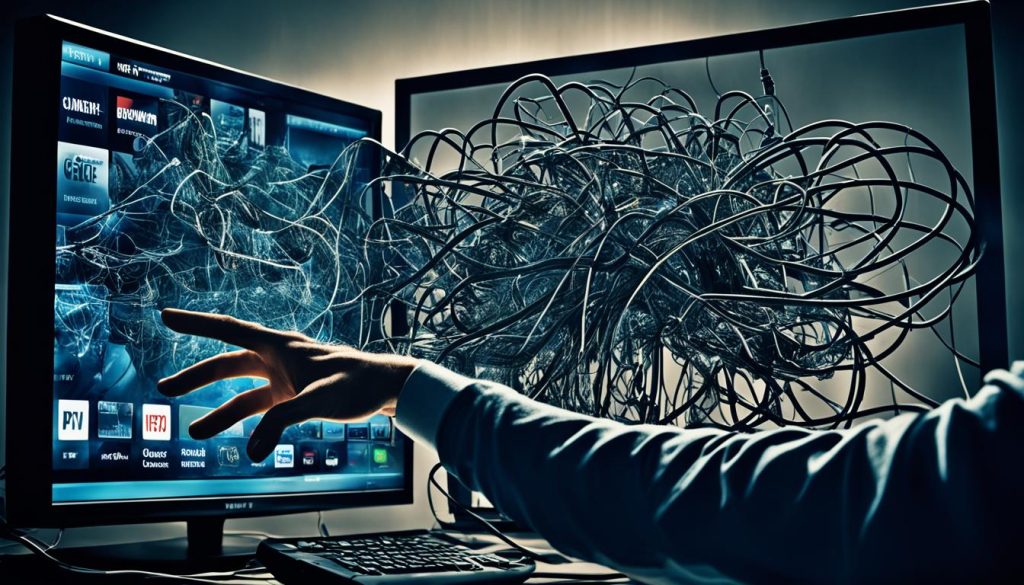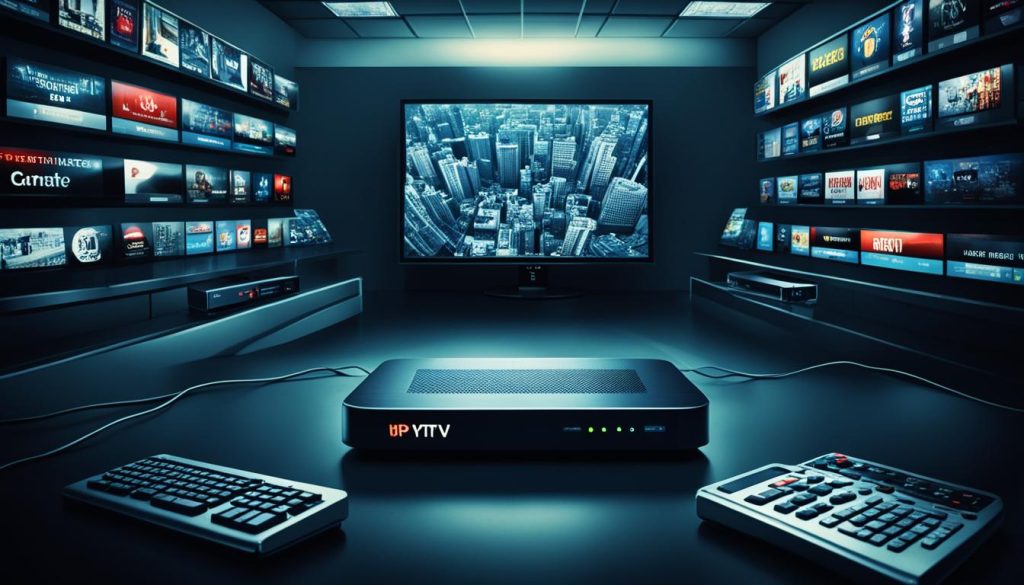Over 17 million people in the UK and the EU used illegal Internet Protocol Television (IPTV) services in 2021, costing legal pay TV providers €3.21 billion. By using these illicit services, users are able to access premium live sports, TV channels, and video on demand content. While accessing illegal IPTV may seem like a convenient, inexpensive alternative, it violates copyright law and poses security risks. This article will provide a comprehensive outline of illegal IPTV services and the legal implications of using them.
Key Takeaways
- Over 17 million people in the UK and EU used illegal IPTV services in 2021, costing legal providers billions.
- Accessing illegal IPTV allows users to stream premium content without permission, violating copyright law.
- Using illegal IPTV services poses significant security risks to users.
- The UK and US have implemented stricter laws and penalties for illegal streaming and IPTV use.
- It is crucial to only use legal, licensed IPTV providers to avoid legal consequences and security issues.
Understanding IPTV and Its Legal Implications
Internet Protocol Television, or IPTV, is a transformative technology that is reshaping the way we consume television content. By converting traditional television signals into digital IP packets, IPTV allows users to access a wide range of programming through their internet-connected devices, including live TV, video-on-demand, and catch-up services.
What is IPTV?
IPTV is a technology that uses the Internet Protocol (IP) to deliver television content over broadband internet connections. Unlike traditional broadcast or cable TV, IPTV content is transmitted as data packets, allowing users to access it on a variety of devices, such as smart TVs, set-top boxes, smartphones, and tablets.
Types of IPTV Services
There are three primary types of IPTV services:
- Live TV: This allows users to stream television programmes in real-time, just as they would with traditional broadcast or cable TV.
- Video-on-Demand (VoD): This service provides users with the ability to watch a range of TV shows, movies, and other video content at their convenience, without the constraints of a fixed programming schedule.
- Catch-up TV: This service enables users to watch previously broadcast TV shows within a limited time frame, often up to 7 or 30 days after the original air date.
The Legal Status of IPTV
The legal status of IPTV services depends on the licensing and permissions held by the service provider. If an IPTV provider has obtained the necessary licences and content rights from copyright holders, the service is considered legal. However, if the IPTV provider does not have the appropriate licences, the service is deemed illegal and constitutes copyright infringement. Over the past few years, illegal IPTV networks have become a significant problem, as they often steal premium content directly from legitimate services and stream it to their customers at a fraction of the price.
Is using IPTV considered piracy?
Illegal IPTV works by providers obtaining channels and content through unlawful means. This content is then streamed over the internet using servers controlled by the illegal IPTV provider. While illegal IPTV services may be free or inexpensive, there are significant risks in accessing content this way, including violating copyright law, potential security risks from the software involved, and an unreliable streaming experience.
How Does Illegal IPTV Work?
Illegal IPTV providers obtain copyrighted television channels and on-demand content through piracy and copyright infringement. They then use their own servers to stream this illegal IPTV content to their customers, often offering it at a fraction of the cost of legitimate services. This not only poses streaming security risks but also enables copyright infringement on a large scale.
The UK Law on Illegal IPTV
The implementation of the Digital Economy Act (2017) in the UK resulted in tougher consequences for individuals found guilty of copyright infringement. Using, selling and providing illegal IPTV services is classed as an act of copyright infringement, which can potentially lead to a 10-year prison sentence and hefty copyright infringement penalties.
The US Law on Illegal IPTV
The Protecting Lawful Streaming Act was implemented in the US in response to an increase in illegal streaming and streaming piracy. Under this law, using and providing illegal IPTV services is now charged as a felony.

Conclusion
In conclusion, while IPTV technology itself is not inherently illegal, accessing unauthorised and unlicensed IPTV services is considered piracy and copyright infringement, with serious legal consequences in both the UK and the US. Users of illegal IPTV face potential fines and prison sentences, as well as security risks from the software and services involved.
To avoid these issues, it is crucial to only use legal, licensed IPTV providers that have the proper content rights and permissions. The use of illegal IPTV services not only violates copyright law but also exposes individuals to significant financial and legal risks. By opting for legitimate IPTV providers, consumers can enjoy a reliable and secure streaming experience while supporting the content creators and industries they value.
Ultimately, the responsibility lies with each individual to ensure they are accessing IPTV services through lawful and authorised channels. Prioritising legal IPTV solutions not only protects one’s own interests but also contributes to the sustainability of the media and entertainment industry as a whole.
FAQ
What is IPTV?
IPTV is a technology used to broadcast television through the internet. It works by converting television content into IP packets which are then transmitted over the internet. Users can access this content on a range of devices with an internet connection, typically for on-demand and streaming services.
What are the different types of IPTV services?
There are three main types of IPTV services: live television which allows users to stream TV programmes in real-time; video on demand which allows users to watch a range of TV shows and movies at their convenience; and catch-up TV which allows users to watch previously broadcast TV shows during a limited period.
What is the legal status of IPTV services?
The legal status of IPTV services depends on whether the provider has the appropriate licences for the content they are streaming. If the IPTV provider does not have the copyright owner’s permission, the IPTV service is considered illegal.
How does illegal IPTV work?
Illegal IPTV works by providers obtaining channels and content through illegal means. This content is then streamed over the internet using servers controlled by the illegal IPTV provider. While illegal IPTV services may be free or inexpensive, there are significant risks in accessing content this way, including violating copyright law, potential security risks from the software involved, and an unreliable streaming experience.
What are the legal consequences of using illegal IPTV in the UK?
The implementation of the Digital Economy Act (2017) in the UK resulted in tougher consequences for individuals found guilty of copyright infringement. Using, selling and providing illegal IPTV services is classed as an act of copyright infringement, which can potentially lead to a 10-year prison sentence.
What are the legal consequences of using illegal IPTV in the US?
The Protecting Lawful Streaming Act was implemented in the US in response to an increase in illegal streaming. Under this law, using and providing illegal IPTV services is now charged as a felony.



